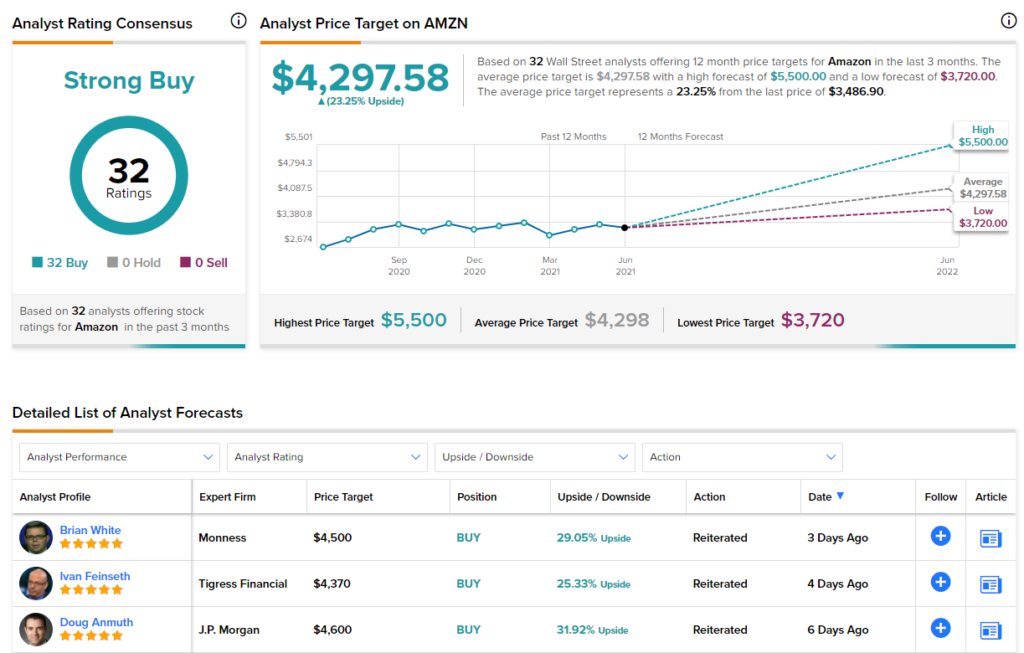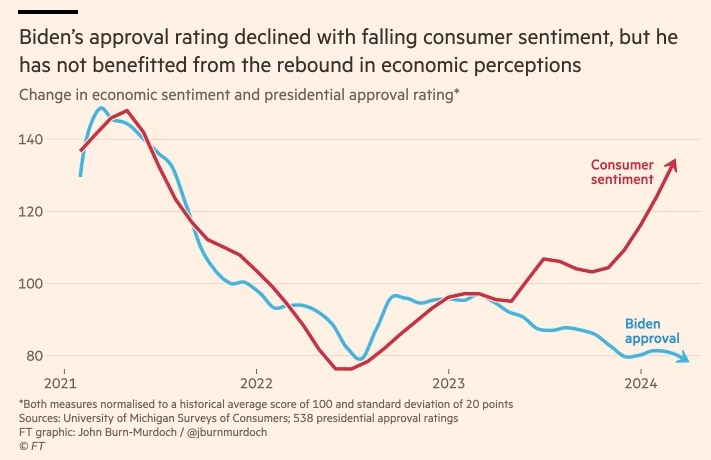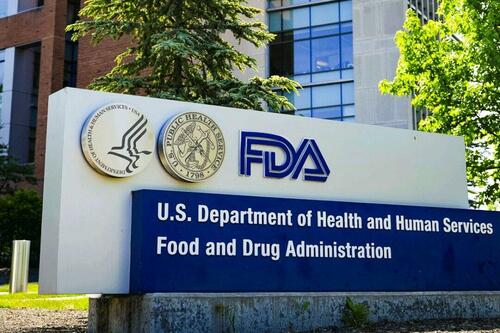Is Amazon Stock a Buy Ahead of Prime Day? This Is What You Need to Know
Amazon’s (AMZN) Prime Day will kick off early this year, taking place at the start of the week, on June 21-22 (Monday and Tuesday), instead of in July (apart from
Read More…
The post Is Amazon Stock a Buy Ahead of Prime Day? This Is What You Need…

Amazon’s (AMZN) Prime Day will kick off early this year, taking place at the start of the week, on June 21-22 (Monday and Tuesday), instead of in July (apart from last year’s pandemic-dictated October event).
The shopping festivities will include over 2 million deals for the 200 million strong Prime subscribers across the globe. However, non-Prime members can also enjoy the Prime Day Show event streamed on Amazon Prime Video. This three-episode event remains available for 30 days with segments dedicated to Billie Eilish, H.E.R. and Kid Cudi. Making the most of Amazon’s interplay between ecommerce and media, to mark the event, Billie Eilish also launched merchandise exclusively on Amazon.
While millions across the globe are set to participate in the promotional shopping extravaganza, the event coincides with more scrutiny of Big Tech.
Last week, the House Judiciary Committee’s Antitrust Subcommittee drafted five bills intended to curtail the influence of Amazon and its fellow tech giants Alphabet, Facebook and Apple.
While segments of each bill could have consequences for all four companies, Monness’ Brain White believes “some bills appear more consequential than others.”
“In our view,” the 5-star analyst said, “The ‘Ending Platform Monopolies Act’ appears highly relevant to Amazon. The act is designed, ‘To Promote competition and economic opportunity in digital markets by eliminating the conflicts of interest that arise from dominant online platforms’ concurrent ownership or control of an online platform and certain other businesses.’ Also, the ‘Platform Competition and Opportunity Act’ and the ‘American Choice and Innovation Online Act’ appear pertinent to Amazon.”
How these will affect the company in the long-term is unknown, but for now, White believes Amazon stock’s middling performance of late is no reflection of its real-world strength. After the pandemic-driven “surging demand,” White believes the ecommerce leader is “uniquely positioned to exit this crisis as one of the biggest beneficiaries of accelerated digital transformation.”
Accordingly, White has a Buy rating on Amazon shares, backed by a $4,500 price target. Investors could be sitting on gains of 29%, should White’s thesis prove correct. (To watch White’s track record, click here)
White thinks Amazon stock is due to break out of the past few months’ range-bound display, and so do the rest of Wall Street’s analyst corps. The stock has a Strong Buy consensus rating based on a unanimous 32 Buys, while the $4,297.58 average price target indicates gains of 23% could be in store over the following months. (See Amazon stock analysis on TipRanks)
To find good ideas for stocks trading at attractive valuations, visit TipRanks’ Best Stocks to Buy, a newly launched tool that unites all of TipRanks’ equity insights.
Disclaimer: The opinions expressed in this article are solely those of the featured analysts. The content is intended to be used for informational purposes only. It is very important to do your own analysis before making any investment.
The post Is Amazon Stock a Buy Ahead of Prime Day? This Is What You Need to Know appeared first on TipRanks Financial Blog.
stocks pandemicInternational
The Realpolitik Grand Divergence
The diverging relationship between economic performance and political success in the U.S. highlights a shift from the past, where a strong economy positively…

The diverging relationship between economic performance and political success in the U.S. highlights a shift from the past, where a strong economy positively impacted incumbent approval ratings. President Biden’s approval ratings remain unaffected despite recent economic improvements, suggesting a decoupling of economic sentiment and political fortunes. This phenomenon, which contrasts with stable economic-political linkages in Europe, is attributed to the U.S.’s heightened partisan divide, where political allegiance increasingly dictates economic perception, challenging the traditional belief that “It’s the economy, stupid” in American politics.
Key Points:
- President Clinton’s political advisor, James Carville, highlighted the economy’s role in political success during 1992 presidential campaign with assertion, “It’s the economy, stupid.”
- Voter sentiment has traditionally linked to economic performance, affecting incumbent party success.
- Recent trends show a disconnect between the U.S. economy’s health and President Biden’s approval ratings.
- The COVID-19 pandemic and inflation crisis may have influenced this anomaly, yet the shift predates these events.
- Research indicates a decoupling of economic sentiment and presidential approval in the U.S. since Obama’s tenure.
- This phenomenon seems unique to the U.S., with European governments’ popularity still tied to economic conditions.
- U.S. political polarization may explain the decoupling, with partisan views influencing economic perceptions.
- Studies suggest that political biases skew individual economic assessments (confirmation bias) impacting presidential approval.
- The current U.S. political climate suggests economic policy impact on electoral decisions is diminishing.
- Contrasts with Europe, where economic sentiment is more uniform across political lines, suggesting a more rational political-economic relationship.
Source: Financial Times
european europe pandemic covid-19Government
FDA Settles Ivermectin Case, Agrees To Remove Controversial ‘Stop It’ Post
FDA Settles Ivermectin Case, Agrees To Remove Controversial ‘Stop It’ Post
Authored by Zachary Steiber via The Epoch Times (emphasis ours),
The…

Authored by Zachary Steiber via The Epoch Times (emphasis ours),
The U.S. Food and Drug Administration (FDA) has agreed to remove social media posts and webpages that urged people to stop taking ivermectin to treat COVID-19, according to a settlement dated March 21.
The FDA has already removed a page that said: “Should I take ivermectin to prevent or treat COVID-19? No.”
Within 21 days, the FDA will remove another page titled, “why you should not use ivermectin to treat or prevent COVID-19,” according to the settlement announcement, which was filed with federal court in southern Texas.
“The FDA has not authorized or approved ivermectin for use in preventing or treating COVID-19 in humans or animals,” the page currently states. It also says that data do not show ivermectin is effective against COVID-19, despite how some studies it cites show ivermectin is effective against the illness.
The FDA in the settlement is also agreeing to delete multiple social media posts that came out strongly against ivermectin, including one that stated: “You are not a horse. You are not a cow. Seriously, y’all. Stop it.”
In exchange, doctors who sued the agency are dismissing their claims, the filing states.
“FDA loses its war on ivermectin and agrees to remove all social media posts and consumer directives regarding ivermectin and COVID, including its most popular tweet in FDA history,” Dr. Mary Talley Bowden, one of the doctors, said in a statement. “This landmark case sets an important precedent in limiting FDA overreach into the doctor-patient relationship.”
“We are extremely pleased with the outcome of the settlement as it is a victory for every doctor and patient in the United States,” added Dr. Paul Marik, chief scientific officer of the FLCCC Alliance and another plaintiff. “The FDA interfered in the practice of medicine with their irresponsible language and posts about ivermectin. We will never know how many lives were affected because patients were denied access to a lifesaving treatment because their doctor was ‘just following the FDA.’”
An FDA spokesperson told The Epoch Times in an email that the agency “has chosen to resolve this lawsuit rather than continuing to litigate over statements that are between two and nearly four years old.”
“FDA has not admitted any violation of law or any wrongdoing, disagrees with the plaintiffs’ allegation that the agency exceeded its authority in issuing the statements challenged in the lawsuit, and stands by its authority to communicate with the public regarding the products it regulates,” the spokesperson said. “FDA has not changed its position that currently available clinical trial data do not demonstrate that ivermectin is effective against COVID-19. The agency has not authorized or approved ivermectin for use in preventing or treating COVID-19.”
Ivermectin was approved by the FDA in 1996 to treat several conditions, including onchocerciasis, a tropical disease caused by a parasitic worm.
In the United States, it’s common for doctors to prescribe medicine off-label, or for a different purpose than the one for which the medicine is approved.
After some doctors began prescribing ivermectin for COVID-19, the FDA ramped up its campaign, including the Aug. 21, 2021, post on Twitter, now known as X.
Dr. Bowden and two other doctors sued the FDA, arguing the agency’s actions went beyond its authority, as conferred on it by Congress.
U.S. District Judge Jeffrey Brown dismissed the case in 2022, ruling that the FDA did not act outside the authority. But an appeals court in 2023 ruled in favor of the doctors, finding that the agency “has identified no authority allowing it to recommend consumers ‘stop’ taking medicine.”
Between the time of the ruling and the settlement, the FDA refused to change any of its statements on ivermectin, and asked for a fresh dismissal of the suit.
The Case
Drs. Robert Apter, Bowden, and Marik brought the case in 2022. They said they suffered repercussions after prescribing ivermectin to patients with COVID-19, and that the FDA was to blame.
Dr. Apter, for instance, said that pharmacists refused to fill the prescriptions, citing the FDA.
“This refusal delays his patients in obtaining their prescribed treatment—when early intervention is paramount—while they look for a pharmacy to fill their prescription, if they can find one at all,” the suit states.
He also said that insurance companies were refusing to pay for ivermectin to treat COVID-19.
The suit said the FDA illegally interfered with the relationships between the doctors and patients. The doctors said with regard to ivermectin, the FDA overstepped the authority conferred on it in the Federal Food, Drug, and Cosmetic Act.
Government lawyers argued that the FDA was acting within the confines of the law, and succeeded in getting the dismissal.
Judge Brown, appointed under President Donald Trump, said the FDA’s powers were only limited with regard to medical devices.
“As there is no statute limiting the FDA’s actions here, it cannot have acted outside of any statutory limitations,” he wrote in his ruling. “Further, it cannot be said that the FDA had no colorable basis of authority. The FDA is charged by Congress with protecting public health and ensuring that regulated medical products are safe and effective, among other things.”
A three-judge panel of the U.S. Court of Appeals for the Fifth Circuit disagreed, finding that the law did not authorize the FDA to give medical advice.
“FDA can inform, but it has identified no authority allowing it to recommend consumers ‘stop’ taking medicine,” U.S. Circuit Judge Don Willett, appointed under President Trump, wrote for the court. The appeals court remanded the case back to the district court.
International
The Grand Realpolitik Divergence
The diverging relationship between economic performance and political success in the U.S. highlights a shift from the past, where a strong economy positively…

The diverging relationship between economic performance and political success in the U.S. highlights a shift from the past, where a strong economy positively impacted incumbent approval ratings. President Biden’s approval ratings remain unaffected despite recent economic improvements, suggesting a decoupling of economic sentiment and political fortunes. This phenomenon, which contrasts with stable economic-political linkages in Europe, is attributed to the U.S.’s heightened partisan divide, where political allegiance increasingly dictates economic perception, challenging the traditional belief that “it’s the economy, stupid” in American politics.
Key Points:
- President Clinton’s political advisor, James Carville, highlighted the economy’s role in political success during 1992 presidential campaign with assertion, “It’s the economy, stupid.”
- Voter sentiment has traditionally linked to economic performance, affecting incumbent party success.
- Recent trends show a disconnect between the U.S. economy’s health and President Biden’s approval ratings.
- The COVID-19 pandemic and inflation crisis may have influenced this anomaly, yet the shift predates these events.
- Research indicates a decoupling of economic sentiment and presidential approval in the U.S. since Obama’s tenure.
- This phenomenon seems unique to the U.S., with European governments’ popularity still tied to economic conditions.
- S. political polarization may explain the decoupling, with partisan views influencing economic perceptions.
- Studies suggest that political biases skew individual economic assessments, impacting presidential approval.
- The current U.S. political climate suggests economic policy impact on electoral decisions is diminishing.
- Contrasts with Europe, where economic sentiment is more uniform across political lines, suggesting a more rational political-economic relationship.
Source: Financial Times
european europe pandemic covid-19-

 Spread & Containment1 week ago
Spread & Containment1 week agoIFM’s Hat Trick and Reflections On Option-To-Buy M&A
-

 Uncategorized4 weeks ago
Uncategorized4 weeks agoAll Of The Elements Are In Place For An Economic Crisis Of Staggering Proportions
-

 International2 weeks ago
International2 weeks agoEyePoint poaches medical chief from Apellis; Sandoz CFO, longtime BioNTech exec to retire
-

 Uncategorized4 weeks ago
Uncategorized4 weeks agoApparel Retailer Express Moving Toward Bankruptcy
-

 International2 weeks ago
International2 weeks agoWalmart launches clever answer to Target’s new membership program
-

 Uncategorized1 month ago
Uncategorized1 month agoGOP Efforts To Shore Up Election Security In Swing States Face Challenges
-

 Uncategorized4 weeks ago
Uncategorized4 weeks agoKey Events This Week: All Eyes On Core PCE Amid Deluge Of Fed Speakers
-

 Uncategorized4 weeks ago
Uncategorized4 weeks agoA Blue State Exodus: Who Can Afford To Be A Liberal





















